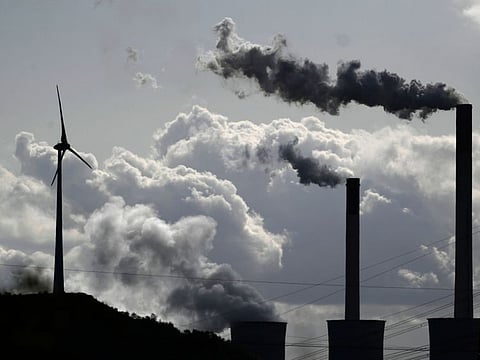Why a different approach to climate change is needed
If action on global warming is to be taken, critics must be faced down with their views

Vladimir Putin became on Friday the latest world leader to cast doubt on the man-made origins of climate change. The Russian president’s scepticism comes only days after the longest UN global warming summit on record nearly collapsed underlining that a new way of tackling global warming is needed.
Ultimately, a weak compromise deal was agreed last week at the Madrid summit which will see all countries putting new climate pledges on the table by the time of the next summit next November in Glasgow. However, there were big divisions at the conference with countries including Putin’s Russia, Australia, the United States, and Brazil, blamed by some, including the Alliance of Small Island States, for thwarting the level of ambition needed to realise the Paris Treaty’s goal of limiting global warming to 1.5 degrees Celsius.
This continues a pattern seen at last year’s summit which underlined that the post-2015 international consensus around tackling this issue is under attack again by multiple key governments. This threatens to slow the pace of efforts to decarbonise, and it is clear that a different approach is now needed to tackle global warming.
Madrid has shown that a grass roots-driven approach needs to be accelerated which allows for more organisations and individuals to lead the fight against climate change.Andrew Hammond
With a growing number of governments from the United States to Russia and Brazil and Australia are raising concerns about the 2015 Paris deal, the Madrid event will hopefully prove a line in the sand. It is crystal clear that if the necessary action on global warming to mitigate its worst impacts is to be undertaken, critics such as Donald Trump need to be faced down with their views about global warming.
Trump and others have lambasted the Paris agreement arguing it is a grand hoax and unwelcome distraction, despite the now overwhelming evidence about the risks of climate change. Yet, even if, remarkably, it turns out that the vast majority of scientists in the world are wrong about global warming, what the Paris deal will help achieve is moving more toward gradually cleaner energies, making the world a less polluted and more sustainable place. Alternatively, the consequences of a failure to act now, as climate sceptics seem to advocate, would be the growing likelihood of devastating environmental damage to the planet.
As the United States itself shows, the key to tackling climate change after Paris is increasingly a ‘bottom-up’ rather than ‘top-down’ approach. Even within his own country, Trump is losing the argument with the US private sector and many state and city governments pushing for decarbonisation.
‘America’s Pledge’ climate action group
Take the example of former California Governor Jerry Brown and ex-New York Mayor Michael Bloomberg who are leading an ‘America’s Pledge’ climate action group with more than 3,000 US cities, states and businesses attempting to deliver a 26 per cent reduction in greenhouses gases by 2025 under Paris. America’s Pledge assert that it’s now within striking distance of fulfilling this agreement made by the previous Obama administration.
What this underlines is the need for broader empowerment of sub-national organisations across the world who can help lead. While the Paris deal is not perfect, one of its key benefits is that it can cater for the flexible, ‘bottom-up’ approach needed here whereby not just national governments, but also other regional and local players in the public and private sectors move forward.
While the wisdom of this may appear obvious, Paris represents a breakthrough from the more rigid ‘top-down’ 1997 Kyoto Protocol which imposed global, uniform standards. By contrast, Paris created a global architecture for tackling global warming, but fully recognises that a collective effort right across the economy and society is needed, not just national governments. Moreover, it also points to the fact that diverse, often decentralised policies will be required by different types of economies to meet climate commitments rather than ‘one-size-fits all’.
Also Read: Climate: We have run out of time
Also Read: Madrid climate talks an opportunity lost
That this approach makes good sense is reflected in the diversity of climate measures that countries have started to make in response to global warming. This has been illustrated in reports by the Grantham Institute at the London School of Economics, including in 2015, which focused on 98 countries plus the EU, together accounting for 93 per cent of global greenhouse gas emissions.
The study revealed there are more than 800 climate-change laws and policies in place across the world, rising from 54 in 1997. Around 50 countries, including the 28 EU members as a bloc, have economy wide targets to reduce their emissions. Together, they account for over 75 per cent of global emissions.
In addition, around 40 states have economy-wide targets up to 2020, and 22 have targets beyond 2020. Moreover, 86 countries have specific targets for renewable energy, energy demand, transportation or land-use, land-use change and forestry, while some 80 per cent of countries have renewable targets. This underlines that the best way to tackle climate change, going forward, is nations meeting their target commitments in innovative and effective ways that builds on this momentum.
Take overall, Madrid has shown that a grass roots-driven approach needs to be accelerated which allows for more organisations and individuals to lead the fight against climate change. If countries now leverage the flexibility of the Paris framework, it can therefore deliver on this ambition and become a key foundation stone of future sustainable development for billions across the world in the 2020s and potentially beyond.
— Andrew Hammond is an Associate at LSE IDEAS at the London School of Economics


